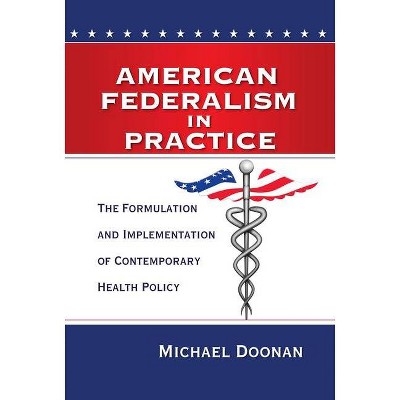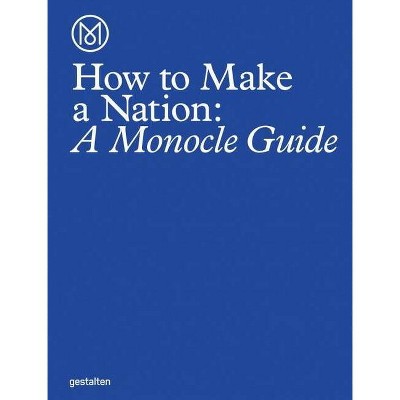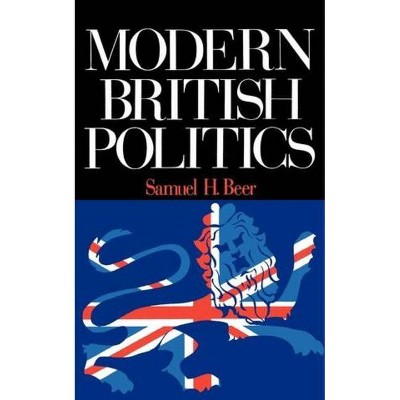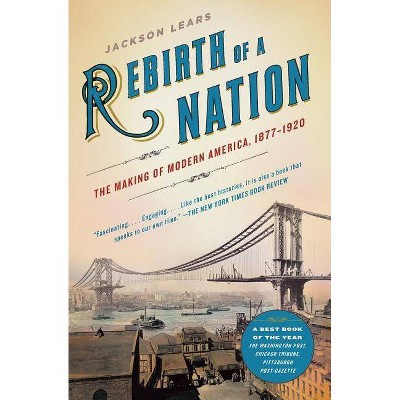To Make a Nation - (Rediscovery of American Federalism) by Samuel H Beer (Paperback)
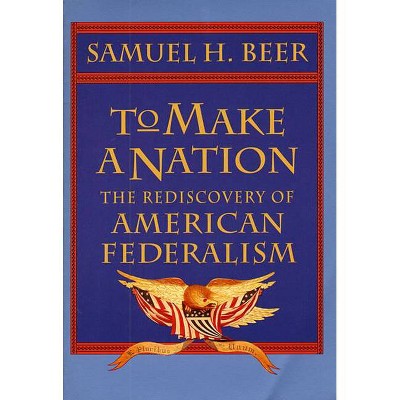
Similar Products
Products of same category from the store
AllProduct info
<p/><br></br><p><b> About the Book </b></p></br></br>Samuel Beer reveals the provenance, purpose, and origins of the ideas of nationalism and federalism in American political philosophy. From the great English republicans of the 17th century to the conflicts of ideas that exist to this day, he reveals unsuspected dimensions that have shaped--and are still shaping--America.<p/><br></br><p><b> Book Synopsis </b></p></br></br><p>Lyndon Johnson heralded a "new federalism," as did Ronald Reagan. It was left to the public to puzzle out what such a proclamation, coming from both ends of the political spectrum, could possibly mean. Of one thing we can be certain: theories of federalism, in whatever form they take, are still shaping our nation. The origin of these theories--what they meant to history and how they apply today--becomes clear in this book by one of our most distinguished writers on political thought. <p/>The great English republicans of the seventeenth century appear in this story along with their American descendants, who took the European idea of a federal republic and recast it as new and unique. Samuel Beer's extraordinary knowledge of European political thought, displayed especially in discussions of Thomas Aquinas and James Harrington, allows him to show at every turn the historical precedents and the originality of American federalism in theory and practice. In deft comparisons with Hume, Burke, Blackstone, and Montesquieu, the familiar figures of Madison and Hamilton emerge with new substance and depth, while some who would seem fully known by now, such as Ben Franklin, reveal unsuspected dimensions, and others, such as James Wilson, are lifted from obscurity. <p/>Beer uses this history to highlight the contrast between the nation-centered federalism of the framers of the Constitution and the state-centered federalism of its opponents. His concern is not only with historical origins but, more important, with a conflict of ideas which reaches far into our history and continues on to this day. The result is the clearest articulation ever given of the provenance and purpose of the ideas of nationalism and federalism in American political philosophy. A masterpiece of historical and political analysis, this book provides an innovative interpretive framework for understanding democracy and the American Constitution.</p><p/><br></br><p><b> From the Back Cover </b></p></br></br>Lyndon Johnson heralded a "new federalism", as did Ronald Reagan. It was left to the public to puzzle out what such a proclamation, coming from both ends of the political spectrum, could possibly mean. Of one thing we can be certain: theories of federalism, in whatever form they take, are still shaping our nation. The origin of these theories - what they meant to history and how they apply to day - becomes clear in this book by one of our most distinguished writers on political thought. The great English republicans of the seventeenth century appear in this story along with their American descendants, who took the European idea of a federal republic and recast it as new and unique. Samuel Beer's extraordinary knowledge of European political thought, displayed especially in discussions of Thomas Aquinas and James Harrington, allows him to show at every turn the historical precedents and the originality of American federalism in theory and practice. In deft comparisons with Hume, Burke, Blackstone, and Montesquieu, the familiar figures of Madison and Hamilton emerge with new substance and depth, while some who would seem fully known by now, such as Ben Franklin, reveal unsuspected dimensions, and others, such as James Wilson, are lifted from obscurity. Beer uses this history to highlight the contrast between the nation-centered federalism of the framers of the Constitution and the state-centered federalism of its opponents. His concern is not only with historical origins but, more important, with a conflict of ideas which reaches far into our history and continues on to this day. The result is the clearest articulation ever given of the provenance and purpose of the ideas of nationalismand federalism in American political philosophy. A masterpiece of historical and political analysis, this book provides an innovative interpretive framework for understanding democracy and the American Constitution.<p/><br></br><p><b> Review Quotes </b></p></br></br><br>[An] engaging account of the origins of federalism... Beer's impressive study demonstrates how much received wisdom about politics was called into question by those who supported the ratification of the Constitution... At a moment when the public conversation is sometimes more acrimonious than enlightened, Beer provides a needed reminder that our unique promise as a people lies in the hope that we might find ways to use our remarkable diversity to make our nation 'more of a nation.'-- "Boston Globe"<br><br>A powerful and persuasive exposition...[and] a brilliant statement in support of the national idea in American federalism.-- "New England Quarterly"<br><br>A vigorous account of the American founders.-- "New Republic"<br><br>Beer's central concern is to refute the idea that the Union was a creation of the states. Rather, he demonstrates, the creation of the Union preceded the establishment of the individual states. This is an issue which has always been contentious and remains so. The case being made here is argued with vigour and with great learning. This book is the product of a long life studying the subject... It is a splendid contribution to the debate about the origins of American federalism.-- "Regional and Federal Studies"<br><br>In a brilliant exploration of history, starting with Thomas Aquinas and continuing through the Framers' views, Beer seeks to demonstrate that federalism need not be viewed solely as a conservative or regressive concept... Beer has made a major contribution to the literature on the subject... If one reads his book looking to gain a better understanding of the origins of American federalism, the book is a tremendous success. It is clearly written, impeccably documented, and extremely persuasive. Moreover, if one wants to refute conservatives' claims that the origins of the doctrine justify their view of federalism, Beer's book is invaluable... [A] masterful new book.-- "Michigan Law Review"<br><br>Samuel H. Beer is a very distinguished political scientist, whose most important earlier work centered on British politics. Here he turns to the study of American origins, with a particular eye to the subject announced in this subtitle, American Federalism... This effort leads him on a wide-ranging foray into intellectual history, tracing the theory of deferential politics through Thomas Aquinas, the old Tories in England, and the British rulers of America in the eighteenth century... Beer's book is too good and too rich to capture in a brief review, and it needs to be read by all interested in the wide range of topics on which it touches.-- "Journal of American History"<br><br>The extraordinary intellectual breadth and analytical depth of Sam Beer's academic work fully warrants his standing as one of America's most distinguished political scientists. In <i>To Make a Nation</i>, he further enhances his scholarly reputation... [This work is] not only enlightening but powerfully suggestive of the capacity of the American political order for regeneration and renewal. America remains a nation in creation and an aspirant idea. Beer shows us why.-- "International Affairs"<br>
Price History
Cheapest price in the interval: 50 on November 6, 2021
Most expensive price in the interval: 50 on February 4, 2022
Price Archive shows prices from various stores, lets you see history and find the cheapest. There is no actual sale on the website. For all support, inquiry and suggestion messagescommunication@pricearchive.us
